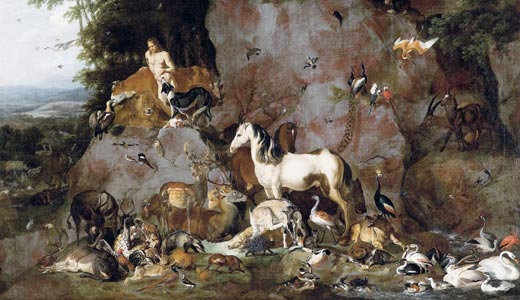Spiritual Sunday
Last week’s Old Testament/Hebrew Bible reading was Adam naming the animals. If I’d been alert, I would have shared John Hollander’s “Adam’s Task,” which imagines Adam entranced by the poetic excitement that comes with inventing new words. So I’m running the poem this week.
The poem reminds me a little of Lewis Carroll, who in one of his greatest poems comes up with his own series of new animal names: “jabberwocky,” “toves,” “borogroves,” “mome raths,” “Jubjub bird,” and “Bandersnatch.” Not to mention adjectives like “brillig,” “slithy,” “mimsy,” “vorpal,” “frumious,” “manxome,“ “uffish,” and “beamish.” And verbs like “gyre,” “gimble,” “whiffle,” “burble,” and “galumph.”
But back to the Hollander poem. I like the way that Adam will float a name and then elaborate on it: “thou, glurd; thou spotted Glurd” (emphasis mine). Or how he’ll be stumbling towards ways to distinguish different members of a species and then just give up: “Thou; thou; thou—three types of grawl.” And sometimes he builds up real momentum and gets lost in the excitement so that, by the end, he wants to embrace all of creation: “Thou, flisket, thou, kabasch; thou, comma-/Eared mashawok; thou, all; thou, all.” When he mentions in the next line “a fire of becoming,” it’s as though he’s marveling at the creative powers of language as much as at the animals themselves.
I’m not entirely sure what Hollander means, in stanza two, by the contrast between “gay, first work” and “sunk to the primitive.” Is “primitive” a way of describing what occurs when the name and the animal have become joined so that we just take them for granted so that the excitement is gone. Is it what Robert Frost is telling us in “Nothing Gold Can Stay”:
Nature’s first green is gold,
Her hardest hue to hold.
Her early leaf’s a flower;
But only so an hour.
Then leaf subsides to leaf.
So Eden sank to grief,
So dawn goes down to day.
Nothing gold can stay.
In “Adam’s Task,” the naming is hard work but, like any activity we love, it doesn’t feel like work. The fourth stanza is challenging but, as I read it, Hollander is indicating that naming is like burning away—perhaps like burning away the impurities in a crucible so that one gets to the essence. And when he inverts our expectations with “serious as play,” I think of children, whose job it is to play because in playing they develop vital life skills. If we could see all work in this light, measuring (which is hard) but humming along as we do so, we could recapture some of Adam’s excitement.
Having reflected on the process, Adam then goes back to the excitement of naming, ending in a flurry of new labels. The problem that stumped him earlier with the grawls he has now solved with the wherrets: he’ll just call one greater and the other lesser. (By the way, I just learned there’s a lesser spotted eagle to go along with the greater spotted eagle.) Then, feeling all the satisfaction of a job well done, he ends the poem abruptly. “Naming’s over. Day is done.”
Our challenge in this life is recapturing Adam’s excitement as we gaze out at God’s creation. Poetry helps us do so.
Adam’s Task
“And Adam gave names to all cattle, and to the fowl of the air, and to every beast of the field. . . “
– Gen. 2:20
Thou, paw-paw-paw; thou, glurd; thou, spotted
Glurd; thou, whitestap, lurching through
The high-grown brush; thou, pliant-footed,
Implex; thou, awagabu.
Every burrower, each flier
Came for the name he had to give:
Gay, first work, ever to be prior,
Not yet sunk to primitive.
Thou, verdle; thou, McFleery’s pomma;
Thou; thou; thou — three types of grawl;
Thou, flisket, thou, kabasch; thou, comma-
Eared mashawok; thou, all; thou, all.
Were, in a fire of becoming,
Laboring to be burned away,
Then work, half-measuring, half-humming,
Would be as serious as play.
Thou, pambler; thou, rivarn; thou, greater
Wherret, and thou, lesser one;
Thou, sproal; thou, zant; thou, lily-eater.
Naming’s over. Day is done.


